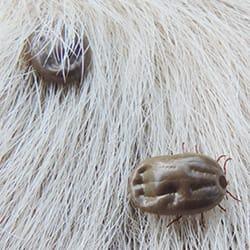It's the middle of Hartford's winter season, which means that most insects are hibernating until the warmer months. You might be thinking this is your time to relax, but you are mistaken. There are many insects still thriving during the colder months—ticks being the most notable. Although ticks become dormant during winter, they can still attach themselves to a host and survive the winter. So you still need to be prepared to deal with ticks even when temperatures drop.
Do ticks live in the winter?
Typically, ticks move around in the summer by attaching themselves to blades of grass and waiting for a host to come by. During the winter, they latch onto their hosts, such as raccoons, squirrels, and deer, and go dormant. Overall, they are less active in the winter, but they don't die off or hibernate. They can and do still feed on their hosts, which means you aren't entirely safe from them.
Because the hosts that ticks cling to during the winter do not hibernate, it's still possible for them to make their way onto your property. That's why it's important to make sure you make your yard less attractive to both ticks and wildlife by keeping it tidy. Removing leaf litter is a great way to do this. Ticks tend to hide in leaf litter and grab onto wildlife that passes through. Also, trimming shrubs and other plants gives ticks fewer hiding spots.
Can a tick bite you in the winter?
Ticks can still feed off you and your pets during the winter despite their dormancy. Even though insects overall pose less of a threat during these months, you'll still want to be vigilant for ticks, frequently inspecting both yourself and your pets.
When inspecting your pets, keep in mind that ticks are small and can be hard to see, even up close. Part their fur and search their skin directly, inspecting their entire body. Don't miss their underbelly, inside and behind their ears, between their toes, and even their tail. If you have chubbier animals with skin folds, make sure to lift those up and inspect them as well.
If you do find a tick, it's important to be very careful when removing it. If the tick pops, it can spread infectious material to both you and your pet. Put on latex gloves and grab tweezers and anti-bacterial wipes. When removing the tick, place the tweezers as close to the skin as possible to make sure the tick head isn't left behind. Gently pull the tick straight up, taking care not to pinch your dog.
After removing the tick, place it in a bag and freeze it. Use the anti-bacterial wipes to clean the wound and prevent infection. Keep a close eye on your pet for any signs of infection or illness, like fatigue, loss of appetite, inflamed skin, or a reluctance to move. If you believe your pet has any of these signs, take it to the veterinarian immediately. Make sure to bring the tick with you to help with a proper diagnosis.
Can you get Lyme disease in the winter?
Ticks can spread the bacteria that directly cause Lyme disease. Even during the winter, ticks still pose this threat, and it's why it is essential to take preventative measures to avoid them. Call American Pest Solutions for help with tick prevention at your Hartford home or business. We have highly trained technicians who will provide you with excellent pest control services and help you combat ticks during winter. Put your faith and trust in us to get rid of your pest problems.

